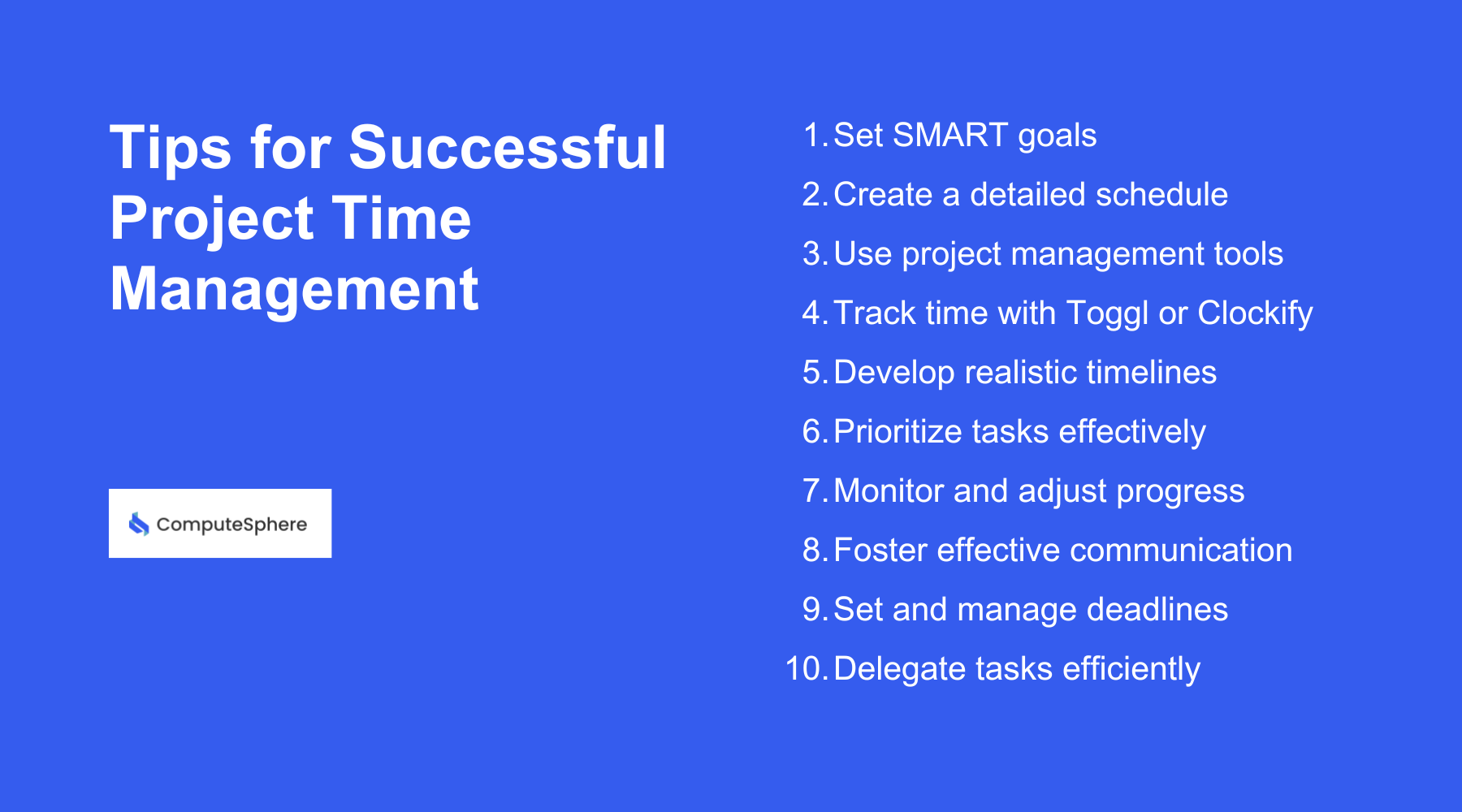10 Tips for Effective Project Time Management: Step-by-Step Guide

Imagine your project running smoothly, with every team member aware of their tasks, deadlines being met without stress, and stakeholders always in the loop. Effective project time management can turn this ideal scenario into reality. As a project manager, mastering time management not only improves your project's success but also ensures you and your team remain productive and stress-free.
In this project time management guide, we will see practical, actionable tips to help you manage your project time efficiently, making every minute count towards achieving your goals.
Understanding Project Time Management
Project time management involves planning, scheduling, and controlling all activities to meet deadlines. It's about setting realistic timelines, focusing on tasks, and using the right tools to track progress. When you master these concepts, you can ensure your projects are delivered on time and within scope, improving your reputation and success as a project manager.
It involves understanding the scope of the project, breaking it down into manageable tasks, and allocating the right resources to complete these tasks efficiently. Time management also includes regular monitoring and adjusting plans to ensure the project stays on track.
By mastering these skills, you can anticipate potential delays, address them proactively, and keep your project moving forward smoothly.
Tips for Successful Project Time Management

Setting Clear Project Goals and Objectives
Clear goals and objectives are also equally important for effective time management. Without a clear direction, your project can easily veer off course. By setting SMART goals—Specific, Measurable, Achievable, Relevant, and Time-bound—you can provide a clear roadmap for your project.
For example, if your goal is to increase website traffic by 20% in six months, you have a specific, measurable target to guide your efforts. This clarity helps you allocate time and resources more effectively, keeping your project on track from the outset.
Creating a Detailed Project Schedule
Once you have clear goals, creating a detailed project schedule becomes the next important step. Break down the project into smaller, manageable tasks, and assign deadlines to each. Project management tools can be incredibly helpful in organizing and visualizing your schedule. These tools allow you to see the big picture, make adjustments as needed, and ensure that every team member knows their responsibilities and deadlines.
Utilizing Time Management Tools
Time management tools are necessary for tracking progress and ensuring you meet your deadlines. Tools like Toggl and Clockify help you monitor the time spent on each task, identify bottlenecks, and improve productivity. By implementing these tools, you stay aware of how time is being allocated and can make necessary adjustments in real time.
Developing Effective Project Timelines
An effective project timeline provides a clear roadmap for your project. When creating timelines, it's important to be realistic and account for potential delays. Including buffer time for unforeseen issues ensures that your project stays on track even when unexpected challenges arise. Regularly updating your timeline with new information keeps your project agile, preventing small issues from becoming major setbacks.
Organizing Tasks and Activities
Organizing tasks ensures that the most important activities receive attention first. Techniques like the Eisenhower Matrix, which categorizes tasks based on urgency and importance, or the ABC method, which ranks tasks by priority, can be incredibly useful.
By focusing on high-priority tasks, you can manage your time more effectively and ensure that essential activities are completed on time. This strategic approach helps you avoid getting bogged down in less important tasks and keeps your project moving forward smoothly.
Monitoring Progress and Adjusting Plans
Regularly monitoring your project's progress is also important for staying on track. Conducting weekly check-ins and using progress tracking tools like Jira or Monday.com helps you stay updated and make timely adjustments.
If you encounter delays or changes, adjusting your plans immediately to accommodate these changes prevents minor issues from becoming major obstacles. This continuous monitoring and adjustment process ensures that your project remains on schedule and aligned with its goals.
Effective Communication and Collaboration
Effective communication and collaboration are more important for successful project management. Tools like Slack and Microsoft Teams facilitate seamless communication among team members, ensuring everyone is on the same page. Regular meetings and updates built a collaborative environment, reducing misunderstandings and improving teamwork. Clear communication channels help you address issues promptly, keep stakeholders informed, and maintain a cohesive project team.
Managing Project Deadlines
Managing project deadlines involves setting realistic deadlines from the start and avoiding over-commitment. Ensure that deadlines are achievable and communicate any changes promptly to your team and stakeholders. When deadlines shift, adjust your plans accordingly to meet the new timelines.
Time Management Best Practices
Implementing daily and weekly planning helps you maintain organization and focus. Start each day by outlining your tasks and setting weekly goals to keep your project aligned with its objectives. Avoid procrastination by breaking tasks into smaller, manageable chunks and tackling the most challenging tasks first.
10. Delegating Tasks Efficiently
Delegation is a powerful tool in project time management. As a project manager, you cannot do everything yourself. Assign tasks to team members based on their strengths and expertise. This not only lightens your workload but also enables your team and promotes a sense of ownership. Clearly define each person's responsibilities and provide the necessary resources and support to help them succeed.
Conclusion
To master project time management skills, it is essential to set clear goals, create detailed schedules, use time management tools, develop effective timelines, focus tasks, monitor progress, ensure effective communication, and manage deadlines. By adopting these tips, you can greatly improve your time management skills, ensuring your projects are completed on schedule and within budget. Integrate these strategies to improve your project management approach, guiding your team to success and consistently achieving your project goals.
Contents
Built for Builders. Priced for Startups.
Tired of unpredictable cloud bills? ComputeSphere offers modular, fixed-cost cloud hosting that grows with your startup—no DevOps headaches, no surprises.
Get StartedShare this article
Browse Some Related Blogs
Relevant and related contents you can read









